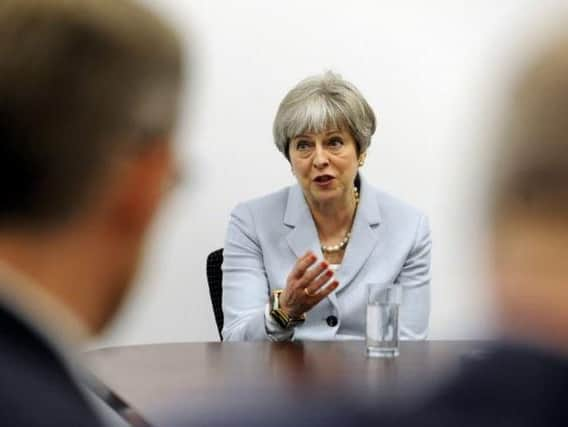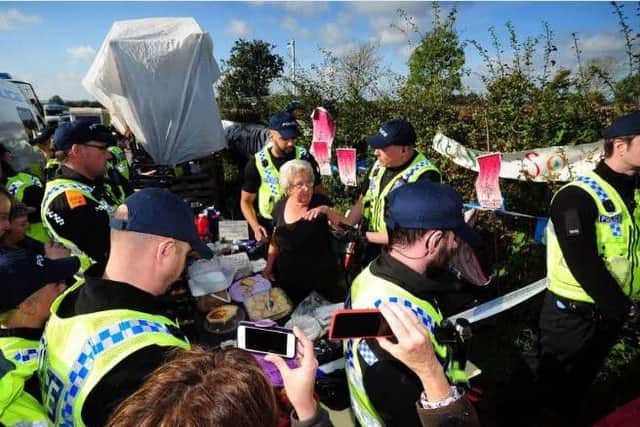Theresa May: Fracking across Yorkshire will be financially beneficial for communities


Speaking exclusively to The Yorkshire Post, Mrs May said the process of extracting shale gas from rocks deep underground will reduce the nation’s reliance on imported energy while residents nearby will potentially be able to claim a share of £10m community funds.
Advertisement
Hide AdAdvertisement
Hide AdSeven companies have Government licences to explore large parts of Yorkshire to see if fracking is feasible. The technique has not been used in the UK since 2011 after it was deemed to have been the cause of earth tremors in Lancashire.


When asked what reassurances she could give people in Yorkshire living close to planned fracking sites, she said: “Shale gas extraction is important because of the impact it can have on our future energy security, which is important for us as a country.
“On the safety side, we have got a very good regulatory regime and very safe regime that has been put in place to deal with this.”
In response to concerns about the potential impact on house prices after a draft Government report suggested in 2015 that property values may drop by seven per cent, Mrs May highlighted the creation of a £1bn ‘shale wealth fund’ which will see money given to affected communities to spend how they wish.
Advertisement
Hide AdAdvertisement
Hide Ad“One of the things I was very clear about at an early stage is that I wanted to make sure that local communities could benefit more from when shale gas extraction takes place in their areas, hence the wealth fund that has been created,” she said.


“There is the opportunity for local communities to be able to decide how that money is spent to the benefit of their local area.”
The fund was first announced by former Chancellor George Osborne in November 2015 but after Mrs May became Prime Minister in August 2016, she announced plans to change a consultation on the scheme to include the option of making payments directly to local residents instead of going to councils and local authorities.
It was suggested at the time individual households could receive up to £20,000 in compensation. The money is being raised from setting aside ten per cent of the tax revenues arising from shale gas production work.
Advertisement
Hide AdAdvertisement
Hide AdBut critics said at the time the proposal amounted to “little more than bribes”.
In November last year, the Government confirmed up to £10m would be available per local community, giving local residents the chance to decide how to spend the money - potentially including on direct payments to themselves, as well as paying for facilities like play parks and libraries.
The Exchequer Secretary to the Treasury Andrew Jones MP said: “Shale production could play an important part in the UK’s future energy security. The economic benefits must be shared with those living alongside these sites and this funding will ensure local people reap the rewards too.”
Why Yorkshire is on the fracking frontline
The Government believes rolling out fracking across the country can reduce the country’s reliance on imported energy. The need for imports has grown in recent years as a result of the decline in North Sea oil and gas production.
Advertisement
Hide AdAdvertisement
Hide AdThe vast majority of licences for exploration work are in northern England. The reason for the surfeit of operators in the area is the Bowland Shale between Lancashire and Yorkshire, described in 2013 as the biggest shale field in the world.
But no fracking has taken place in the UK since 2011, when test drilling operations in Lancashire were deemed to have triggered earth tremors.
The Government and the industry insists the process is safe despite the concerns of environmentalists and work had been due to start imminently on test fracking on the outskirts of the village of Kirby Misperton in Ryedale by a company called Third Energy.
But after the Government ordered a review of the firm’s financial accounts, Third Energy has withdrawn equipment from the site, with it now uncertain when work will actually begin.
Advertisement
Hide AdAdvertisement
Hide AdTwo public inquiries are due to take place later this year on parallel plans by petrochemical giant Ineos to start exploration work close to Rotherham and Sheffield to see if the process is feasible in South Yorkshire and North Derbyshire.
Both Third Energy and Ineos have exploration rights for large parts of North Yorkshire, while iGas has planning permission for exploratory wells near the village of Misson, a few miles from Doncaster.
A further bid by Ineos to carry out a fracking survey on National Trust land in the region is to be heard in the High Court.
The company has been granted permission to pursue its application to undertake a geophysical survey in Clumber Park, near Worksop in Nottinghamshire, and close to the South Yorkshire border, to the High Court.
Advertisement
Hide AdAdvertisement
Hide AdThe National Trust says the company had not considered the “potential environmental impacts” on the Grade I-listed park and does not wish its land to be used for fracking. The trust said on Thursday it was disappointed the matter has been referred to the courts.